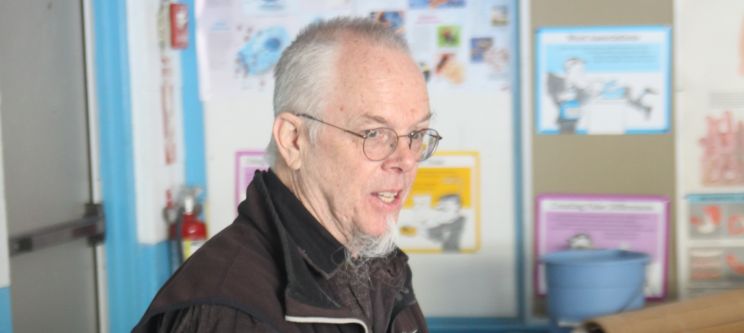David Holzapfel Scratching Curiosity’s Itch

For 26 years, David Holzapfel ’72 employed the same model of experiential learning he engaged in at Marlboro College for fifth and sixth-graders at Marlboro Elementary School. He retired in June 2015, but not before being recognized by the Vermont Humanities Council with the 2014 Victor R. Swenson Humanities Educator Award.
A sign at the front of David Holzapfel’s classroom quoted educator John Holt: “The true test of intelligence is not what we know how to do, but how we behave when we don’t know what to do.” David says it’s been there since he started teaching at Marlboro Elementary School in 1989, and in many ways it defines his unabashedly hands-on, inquiry-based approach to education.
“Curiosity’s itch is satisfied through focused learning, through real experience,” says David, who compared his classroom investigations to his Plan of Concentration in Italian literature, poetry, and translation. “My own experiences of conducting independent research at Marlboro College serve as a model for the immersive education I engage in with students.”
David didn’t always know he would be a teacher. He devoted 16 years after college to woodworking, establishing a studio called Applewoods with his wife Michelle Chasse Holzapfel ’73, and creating other-worldly furniture from hardwood slabs and burls. He began teaching in 1979 as an artist-in-residence, first with the Horizons Program, followed by the Vermont Council on the Arts. Over the years he enjoyed woodworking, mask making, and totem pole carving with students.
“Those varied experiences enabled me to recognize how much I enjoyed ‘doing stuff’ with kids,” he says. “‘Doing stuff’ with kids has continued to be my favorite aspect of teaching.” Since he began teaching, his time in the studio has been limited; he works primarily on commissions at this point. “But whether in the studio or in the classroom with kids, the same essential issues of problem solving are at the forefront.”
Although David found countless opportunities for “doing stuff” with kids in the classroom, it’s his forays into hands-on field research that he finds most satisfying. During his time at Marlboro Elementary School, he developed three extensive field research experiences with kids. He led weeklong adventures to New York City and Cape Cod on alternate years, and natural history studies at Hogback Mountain Conservation Area every fall. In each case, students conducted individual research projects, such as interviewing traders at the New York Stock Exchange, learning the history of lighthouses from local experts, and collecting data on Vermont’s changing forest ecosystems.
“In addition to deep, active learning, field research instills in students a sense of place,” says David. “Meaningful interactions with a location and work within a community engender in all of us a sense of belonging, of connection.” It also takes an extraordinary amount of time, and planning, and support, and trust, things often discouraged by ever-growing pressures toward more superficial “coverage” and preparation for standardized tests. David credits former principals Bruce Cole ’59 and Connie Barton with establishing a tone at Marlboro School that continues to this day: teachers are encouraged to teach what they’re excited about.
“The temporal aspects of learning seem rarely considered by policy makers, and yet we all know that those topics to which we dedicate time are the topics we truly know; this is immersive learning. Field research is hard work for educators in the current climate. But I believe that for students and teachers alike, nothing builds a positive sense of purpose and confidence better than the accomplishment of a difficult task done well.”
For more about David and Michelle’s artwork go to: holzapfelwoodworking.com.

